Typing In Your Sleep with Somno-Type™
Ever feel like sleep is just... wasted time? Eight hours of doing nothing. What if you could write emails, code, or finish your novel, all while you're dreaming? Meet the Somno-Type™, the mattress keyboard that turns your sleep into productive work time.
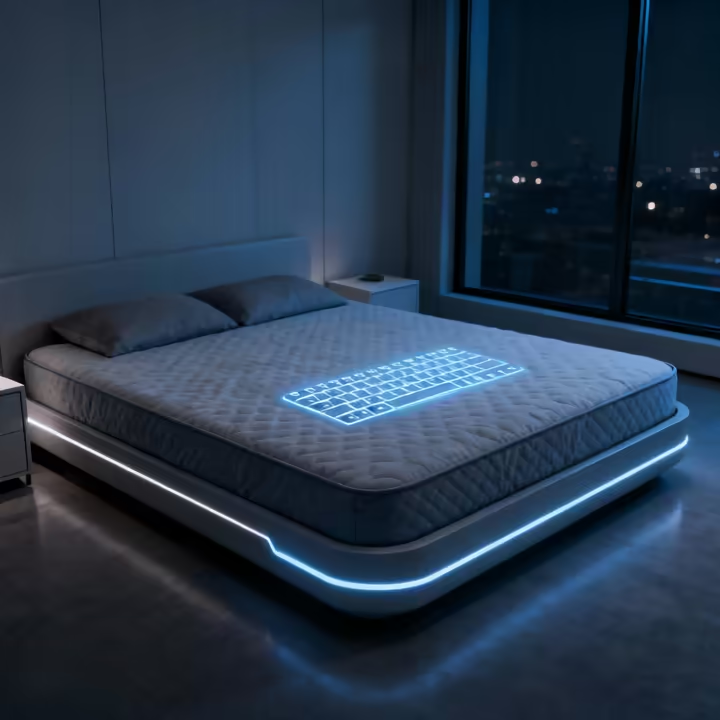
Why Sleep is Wasted Time
Humans waste about a third of their lives sleeping. That's eight hours a day your brain just idles, dreaming about nonsense instead of getting things done. What a waste of potential.
The Somno-Type™ mattress keyboard changes that. It turns your bed into a giant keyboard, letting your subconscious mind get to work while your body rests. You can write emails, code, or get creative... all without waking up.
How It Works (The "Science" Part)
So how does it turn your tossing and turning into a typed document? The Somno-Type™ mattress uses a mix of brain science, motion tracking, and some clever software. It captures and understands what your subconscious is trying to "say" while you sleep.
Subconscious Kinesthetic Mapping (SKM)
Your brain learns to "type" through a process called Subconscious Kinesthetic Mapping (SKM). Basically, your brain starts linking specific movements, like shifting your hip or bending a knee, to keys on the mattress. This happens during deep sleep (NREM Stage 3), when your brain is great at learning new motor skills and locking them into memory.
Think of it like sleepwalking, but for typing. Your body can already do complex things while you're asleep (somnambulism is proof). SKM just gives those movements a purpose.
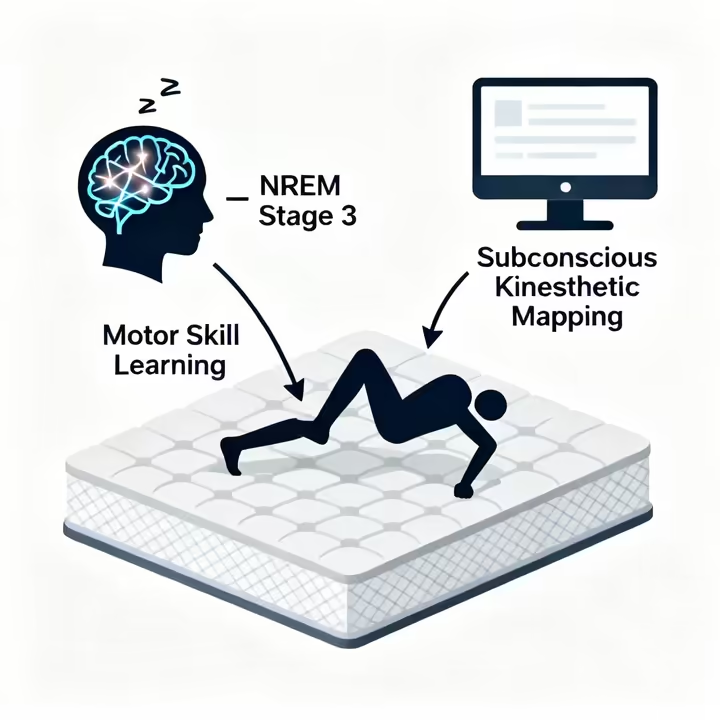
The Somnambulatory Actuation Point (SAP)
The key is the Somnambulatory Actuation Point (or SAP). This is just a fancy term for how much pressure you need to apply to "press" a key. The mattress has 104 big pressure plates inside it, like giant keyboard keys.
These plates work as force-sensitive resistors (FSRs), whose resistance changes under pressure. The software constantly tracks your body's resting pressure and sets the SAP just above that baseline. This way, it knows the difference between you just rolling over and you meaning to type the letter 'Q' with your elbow.
Typing While You Dream (REM Sleep)
The biggest challenge is REM sleep, the stage where you have vivid dreams. During REM, your body is mostly paralyzed (a state called atonia) to stop you from acting out your dreams. A normal pressure keyboard wouldn't work at all.
This is where the proprietary Dream-to-Text™ engine comes in. It cranks up the mattress's sensitivity way, way up to detect tiny muscle twitches that still happen during REM. The software then matches these micro-movements with your brain activity (via EEG data) to figure out the "intent" behind your dream and turn it into text.
The system knows that motor signals can sometimes get through the paralysis, like in people with REM Sleep Behavior Disorder (RBD). The engine just listens for those signals and translates them into creative or conceptual text. This ensures you stay productive even when you're deep in a dream.
Features and Design
The Somno-Type™ isn't just a flat slab of foam. It's designed with full-body ergonomics in mind, taking ideas from fancy office keyboards and applying them to your entire sleeping posture.
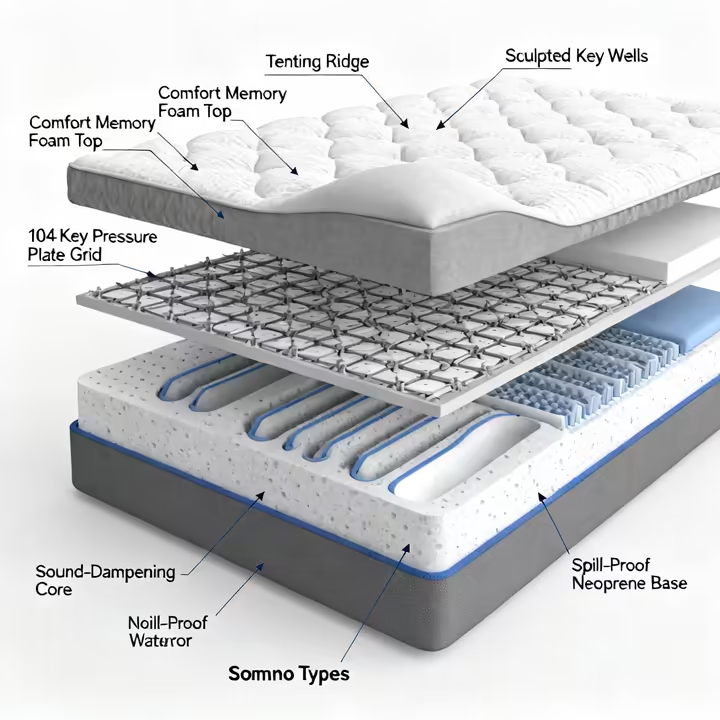
A "tenting ridge" runs down the middle to keep your spine straight, especially if you're a side-sleeper. The surface also has sculpted "key wells" that fit your body's main pressure points, like your shoulders and hips. This makes "typing" easier and helps prevent Repetitive Sleep Injury (RSI).
It's built in layers. The top is comfy memory foam, and underneath that is the layer with the pressure plates. The core is made of a thick, sound-dampening foam to absorb the noise of you furiously typing out a dream-rant, so you don't wake your partner. The whole thing is wrapped in a spill-proof and drool-resistant neoprene base to keep the electronics safe.
How to Build Your Own
Building your own Somno-Type™ is a project. First, you need a big block of memory foam. Then comes the hard part: carving out the 104 key zones and the central ridge. A hot-wire cutter is your friend here.
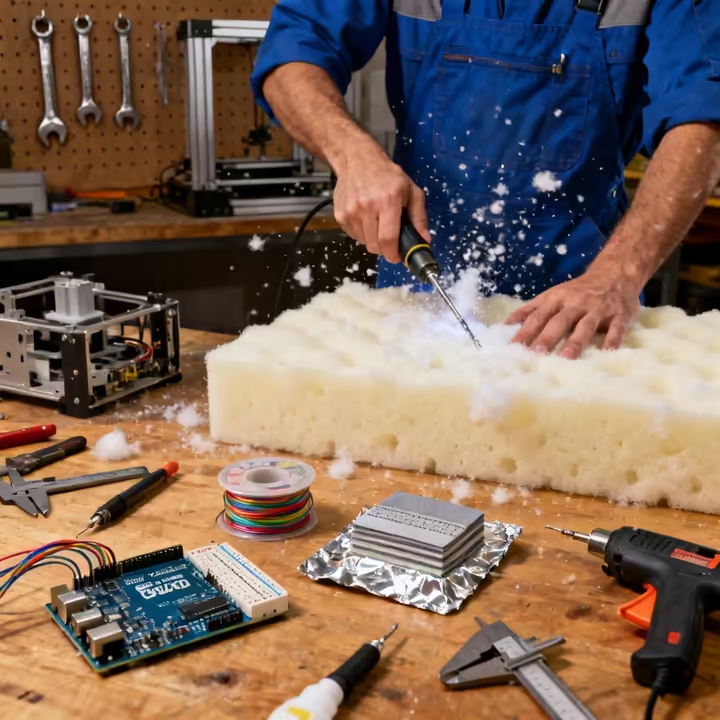
Next, you make the pressure plates. You can build these yourself using pressure-sensitive stuff like Velostat sandwiched between two conductive surfaces. Think, repurposed aluminum pie tins or sensors from an old bathroom scale.
Now for the "Somatic Wiring Harness," which is a scary name for a whole lot of wires. You have to connect all 104 plates to a central brain, like an Arduino or Raspberry Pi. Use good, shielded cables, you don't want your phone charger or electric blanket messing with the signal and making you type gibberish.
What's It Like to Use?
Using the Somno-Type™ is weird at first. You just sleep on it, and for a few weeks, your brain slowly learns the layout via SKM. Then one morning you wake up, and... surprise ! You've already drafted all your work emails, written a chapter of your novel, or coded a new app.
Sometimes, you'll just type a bunch of junk like "asdfjkl;asdfjkl;". This isn't a bug. The Intuitive Gibberish Filter (IGF) software analyzes these random strings, looking for hidden patterns, and might turn your restless night into modern dance notation or a weather forecast.
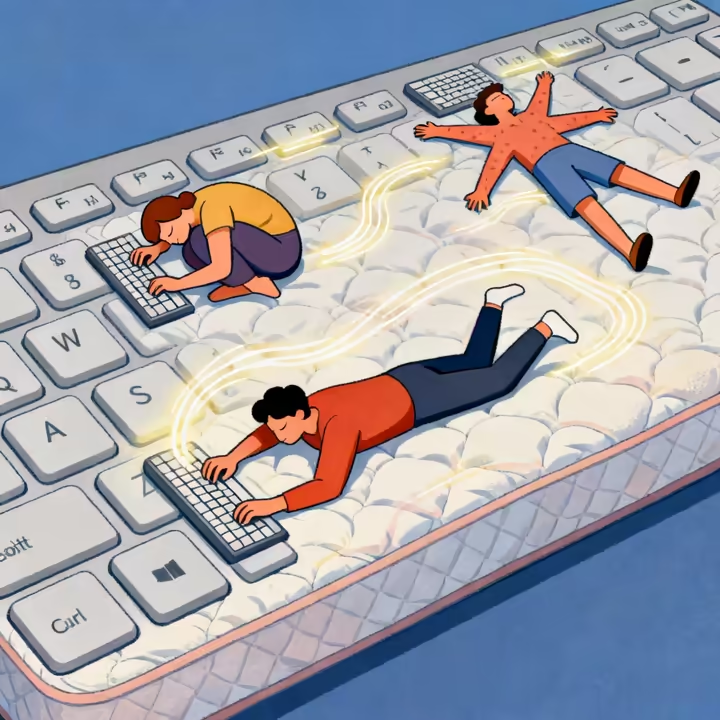
Users develop their own typing styles based on how they sleep. Programmers often use the "Fetal Position Curl," a compact style using knees and elbows for precision. Creative writers might prefer the "Starfish Sprawl," using all four limbs to hit keys across the entire bed. There's also "The Logroller," for writing long documents by slowly rolling from one side to the other.
Frequently Asked Questions
Performance and Speed
How fast can I type? It depends on your sleep stage. In deep sleep (NREM Stage 3), expect a steady 15-20 Words Per Minute (WPM), like thoughtful handwriting. In lighter N2 sleep, you can get bursts up to the average conscious rate of 40 WPM. In REM sleep, it's measured in "Concepts Per Hour" (CPH), since you're translating ideas, not just words.
Sharing the Bed
What if I share my bed? The mattress defaults to "Collaborative Mode," merging both your inputs into one wild, co-authored document. If you'd rather not have your partner accidentally edit your work, the "Partitioned Keymap" firmware upgrade splits the keyboard down the middle. Just try to stay on your side.
Bedding and Cleaning
Do I need special sheets? Regular thick sheets can muffle the signal. We recommend "Somno-Weave™" sheets, which have a conductive silver thread woven in. This helps transfer your movements directly to the mattress sensors.
How do I clean it? Once a quarter, vacuum it, lightly mist it with a mild soap and water solution, then cover it in baking soda. Let it sit for 12 hours to absorb moisture and smells, then vacuum it all off. Don't ever use a steam cleaner, you'll ruin the sensors.
Special Conditions
What about Restless Leg Syndrome (RLS)? The system is smart enough to recognize the rhythmic leg movements. Instead of random letters, it often interprets them as repeated commands, like hitting the spacebar over and over. Some musicians have even used it to create drum patterns in their sleep.
Could a nightmare about falling make me hit Ctrl+Alt+Delete? Nope. A reboot requires a complex "Somatic Secure Attention Sequence," like hitting a key with your shoulder, then holding another with your knee, then double-tapping with your head. You won't do it by mistake.
Custom Layouts
Can I change the key layout? Yes, the default is QWERTY, but the firmware is fully remappable. We're working on new layouts optimized for sleeping, like "DREMR" for side-sleepers and "ZzzERTY" for those who sleep like a starfish. These are designed to make typing even more efficient.
Works cited
- Stages of Sleep: What Happens in a Normal Sleep Cycle? - Sleep Foundation, https://www.sleepfoundation.org/stages-of-sleep
- Physiology, Sleep Stages - StatPearls - NCBI Bookshelf, https://www.ncbi.nlm.nih.gov/books/NBK526132/
- whatfix.com, https://whatfix.com/blog/kinesthetic-learning/#:~:text=Kinesthetic%20learning%2C%20often%20called%20tactile,actively%20engaging%20with%20the%20material.
- What Is Kinesthetic Learning? (+Examples, Benefits) - Whatfix, https://whatfix.com/blog/kinesthetic-learning/
- Primary Sleep Disorders: Parasomnia | Johns Hopkins Medicine, https://www.hopkinsmedicine.org/health/conditions-and-diseases/primary-sleep-disorders-parasomnia
- Parasomnias - PMC - PubMed Central, https://pmc.ncbi.nlm.nih.gov/articles/PMC4016090/
- en.wikipedia.org, https://en.wikipedia.org/wiki/Haptic_technology#:~:text=Haptic%20feedback%20(often%20shortened%20to,of%20one's%20hand%20or%20fingers.
- Haptic technology - Wikipedia, https://en.wikipedia.org/wiki/Haptic_technology
- Arduino Pressure Sensor (FSR) With LCD Display : 5 Steps ..., https://www.instructables.com/Arduino-pressure-sensor-FSR-with-LCD-display/
- How to Make a Ridiculously Cheap Analog Pressure Sensor - Instructables, https://www.instructables.com/How-to-Make-a-Ridiculously-Cheap-Analog-Pressure-S/
- Stages of Sleep | Introduction to Psychology - Lumen Learning, https://courses.lumenlearning.com/waymaker-psychology/chapter/stages-of-sleep/
- Motor Control during Sleep - Journal of Sleep Medicine, https://www.e-jsm.org/journal/view.php?number=29
- REM Sleep at its Core – Circuits, Neurotransmitters, and ... - Frontiers, https://www.frontiersin.org/journals/neurology/articles/10.3389/fneur.2015.00123/full
- The Science of Sleep: Understanding What Happens When You Sleep, https://www.hopkinsmedicine.org/health/wellness-and-prevention/the-science-of-sleep-understanding-what-happens-when-you-sleep
- Increased Motor Activity During REM Sleep Is Linked with Dopamine Function in Idiopathic REM Sleep Behavior Disorder and Parkinson Disease | Journal of Clinical Sleep Medicine, https://jcsm.aasm.org/doi/10.5664/jcsm.5896
- Ergonomic keyboard - Wikipedia, https://en.wikipedia.org/wiki/Ergonomic_keyboard
- How Ergonomic Keyboards Work: Benefits & Features - E3 Consulting, https://www.ergonomicconsultants.com/blog/ergonomic-workspace/how-ergonomic-keyboards-work/
- COMPUTER KEYBOARD DESIGN, https://ergo.human.cornell.edu/AHTutorials/ckd.htm
- What Makes a Keyboard Ergonomic - Meetion, https://www.meetion.com/a-what-makes-a-keyboard-ergonomic.html
- Soundproof Foam, Sound Dampening Foam in Stock - ULINE, https://www.uline.com/BL_2385/Soundproofing-Foam
- Neoprene Fabric: Properties, Types, and Alternatives - Buell wetsuits, https://buellsurf.com/blogs/wetsuit-guides-1/neoprene-fabric-properties-types-and-alternatives
- Neoprene: Everything You Need to Know About This Raw Material | EKI, https://www.ekibv.com/knowledge-base/neoprene
- DIY Pressure Sensor - The Bela Knowledge Base, https://learn.bela.io/tutorials/pure-data/sensors/diy-pressure-sensor/
- Conductive Fabric | Laird Technologies, https://www.laird.com/products/enclosure-level-emi-shielding/emi-tapes/conductive-fabric
- Conductive Woven fabric/Conductive Non-Woven fabric | SEIREN Co., Ltd. - セーレン, https://www.seiren.com/english/products/electro/electronics/fabric/index.html
- Words per minute - Wikipedia, https://en.wikipedia.org/wiki/Words_per_minute
- www.typingpal.com, https://www.typingpal.com/en/typing-test
- One user multiple devices. - meshtastic - Reddit, https://www.reddit.com/r/meshtastic/comments/1lf73qz/one_user_multiple_devices/
- Build multiuser-aware apps - Android Open Source Project, https://source.android.com/docs/devices/admin/multiuser-apps
- Woven Conductive Fabric - 20cm square : ID 1168 - Adafruit, https://www.adafruit.com/product/1168
- Cleaning 101: How to Clean Memory Foam - Wayfair, https://www.wayfair.com/sca/ideas-and-advice/organization/cleaning-101-how-to-clean-memory-foam-T54
- 5 Tips for Cleaning Your Memory Foam Mattress - Design Matters Blog, https://www.matterbrothersfurniture.com/blog/2021/05/29/5-tips-cleaning-memory-foam-mattress/
- Please don't judge... I don't know how to clean my memory foam mattress. Can anyone help? The stains are from previous attempts to do so. : r/CleaningTips - Reddit, https://www.reddit.com/r/CleaningTips/comments/rzc9td/please_dont_judge_i_dont_know_how_to_clean_my/
- Restless legs syndrome - NHS, https://www.nhs.uk/conditions/restless-legs-syndrome/
- Restless legs syndrome - Symptoms - NHS, https://www.nhs.uk/conditions/restless-legs-syndrome/symptoms/
- Restless legs syndrome | NHS inform, https://www.nhsinform.scot/illnesses-and-conditions/brain-nerves-and-spinal-cord/restless-legs-syndrome/
- Control-Alt-Delete - Wikipedia, https://en.wikipedia.org/wiki/Control-Alt-Delete
- Origin of Ctrl-Alt-Delete key combination to reset - Retrocomputing Stack Exchange, https://retrocomputing.stackexchange.com/questions/17032/origin-of-ctrl-alt-delete-key-combination-to-reset
- Dvorak keyboard layout - Wikipedia, https://en.wikipedia.org/wiki/Dvorak_keyboard_layout
- Alternatives to QWERTY - Kinesis, https://kinesis-ergo.com/switching-from-qwerty/
- intro-to-alternative-keyboard-layouts.md - GitHub Gist, https://gist.github.com/dustypomerleau/29f5311089767cfbe5915c5743035710